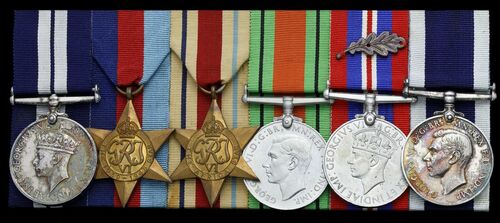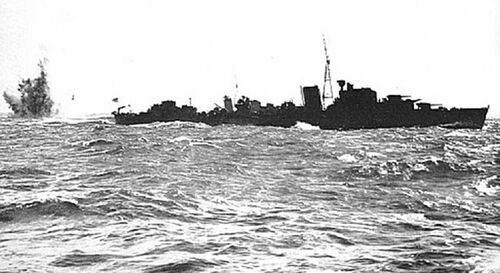Auction: 24002 - Orders, Decorations and Medals
Lot: 183
A fine Second World War destroyer operations D.S.M. group of six awarded to Petty Officer F. J. Cole, Royal Navy
Decorated for his gallant deeds in H.M.S. Jaguar in the Mediterranean - in addition to being 'mentioned' for her part in Operation 'Dynamo' - he was sadly among those lost when she was torpedoed off Sidi Barrani on 26 March 1942
Distinguished Service Medal, G.VI.R. (D/J.110727 F. J. Cole. P.O.); 1939-45 Star; Africa Star; Defence and War Medals 1939-45, with M.I.D. oak leaves; Royal Navy L.S. & G.C., G.VI.R. (J.110727. F. J. Cole. P.O. H.M.S. Jaguar.), edge bruise to first, overall good very fine (6)
D.S.M. London Gazette 1 January 1942.
M.I.D. London Gazette 16 August 1940:
'For services in the withdrawal of the Allied Armies from the beaches at Dunkirk.'
The original - joint - recommendation states:
'The following ratings formed part of the boats' crews engaged in ferrying troops from Bray beach to various ships and were so employed continuously from 14 to 16 hours without food, wet through and subjected to frequent bombing attacks. Commanding Officer Javelin reported that 'the conduct of Jaguar's boats was exemplary and reflects credit on all concerned. They are recommended for mention.'
Frederick John Cole was born in Yarmouth, Norfolk on 12 March 1909 and entered the Royal Navy as a Boy 2nd Class in June 1924.
By the outbreak of hostilities in September 1939, he was serving as a Petty Officer in the destroyer H.M.S. Jaguar, and he remained likewise employed until her - and his - loss in March 1942.
Dunkirk
Under the command of Lieutenant-Commander J. F. W. Hine, R.N., Jaguar played a prominent role in Operation 'Dynamo' in May 1940. On the 27th, she acted as a screen for the evacuation to the north and on the 28th she rescued survivors from the sinking S.S. Abukir. Having then journeyed over to Bray dunes on the morning of the 29th - and thanks to Cole's gallant work in her boats - she was able to pick up around 370 troops.
Back in port, she received new orders to proceed to Dunkirk in the afternoon. On casting off from the east with about 1,000 troops embarked, at 1550 hours, she was attacked again and again by Stukas and near-missed by four bombs. Badly damaged and temporarily disabled, she had to be towed clear of the harbour by her consort Express, which along with the coaster Rika, took off Jaguar's troops.
Listing 17 degrees, Jaguar subsequently restored power and limped back over the Channel to Dover where, among other damage, her port side was revealed to be riddled with holes from shell splinters and machine-gun fire.
Mediterranean
Jaguar joined Force H at Gibraltar in November 1940, the commencement of a busy commission in Mediterranean waters, starting with her participation in the battle of Cape Spartivento on the 27th. Then in January 1941, she served as an escort in the Malta convoy Operation 'Excess' in which she engaged the Italian torpedo boats Circe and Vega on the 10th. With supporting fire from the cruiser Bonaventure, Vega was soon disabled, and Jaguar closed to within 300 yards before raking her with gunfire and setting her ablaze. In total, Jaguar expended 88 4.7-inch and six 4-inch rounds, but the coup de grace was delivered by a torpedo from her consort Hereward.
Having then transferred to the 14th Destroyer Flotilla, Jaguar next saw action in the Dodecanese, when in the early hours of 27 February 1941 whilst assisting in the evacuation of troops from the island of Kastelorizo, she encountered the Italian destroyer Francesco Crispi. In the ensuing exchange of gunfire Jaguar's searchlight was knocked out by a 40mm. shell, causing her to lose contact.
Having then been present in Force D at the battle of Cape Matapan in March, she acted as an escort to three battleships at the bombardment of the port of Tripoli on 20-21 April. Two days later with her consorts Janus, Jervis and Juno, she fought an engagement with an Italian convoy in which the armed motor ship Egeo was sunk south of Lampedusa. In the following month she was present in operations off Crete, delivering ammunition and then assisting in the evacuation, being near-missed by a bomb on 30 May, and in June she participated in operations against the Vichy French in the Syrian campaign, followed by further convoy escort work to besieged Tobruk, and related shore bombardments.
It was about this time that Cole must have been put forward for his D.S.M., which award was duly approved and published in the New Year Honours List in 1942.
Meanwhile, by way of seeing out 1941, Jaguar was accidentally hit by a shell from Jervis on 1 December, killing her commanding officer and a rating. A new captain - Lieutenant-Commander L. R. K. Tyrwhitt, D.S.O., D.S.C., R.N. - was appointed shortly afterwards and one of his first operations was to go to the assistance of Force K, which had a disastrous encounter with an enemy minefield off Tripoli on the night of 18-19 December.
The cruisers Aurora, Penelope and Neptune all struck mines, the latter four of them sinking. Then, in going to assist the stricken cruisers, the destroyer Kandahar had her stern blown off by another mine. Jaguar arrived on the scene on the 20th but was unable to take her consort Kandahar in two due to the heavy seas; but she did pick up 165 survivors before finishing her off with a torpedo.
Journey's end
In the opening months of 1942, Jaguar continued her valuable convoy escort work, and it was in just such an operation that she met her end on 26 March 1942. On that date she was escorting the Greek destroyer Vasilissa Olga, the tanker R.F.A. Slavol and the armed whaler H.M.S. Klo from Alexandria to Tobruk, when the latter was torpedoed by the U-652 and set on fire. Jaguar came alongside Slavol to rescue the oiler's crew but was herself struck by two more torpedoes from the U-652. The resultant explosion broke Jaguar clean in two, the forepart sinking within a minute and the after end in about three minutes, with a loss of three officers and 190 ratings. Cole was among the latter.
The son of Frederick and Laura Cole, and the husband of Alice Elizabeth Cole, of St. Budeaux, Devon, Cole is commemorated on the Plymouth Naval Memorial; the award of his L.S. and G.C. Medal was approved after his death in April 1942 and, in common with his D.S.M., it was sent to his widow.
Subject to 20% VAT on Buyer’s Premium. For more information please view Terms and Conditions for Buyers.
Sold for
£1,200
Starting price
£800







